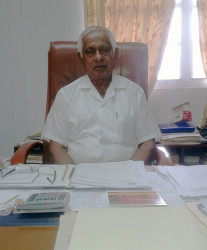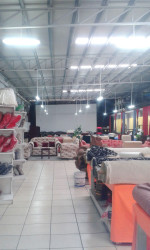Three years ago A & H Kissoon Group of Companies cut trading ties with the city, closing down its well-known distribution outlet at the corners of Camp and Robb streets and shifting those operations to Industrial Site, Ruimveldt on the southern edge of the capital where its factory operations have been located for half a century.
Managing Director of the Kissoon Group of Companies Hemraj Kissoon believes it was a strategically sound move insofar as it located the company’s manufacturing and distribution facilities in a single place. It has, however, had its price. While the company has been able to retain most of its wholesale customers its walk-ins have fallen off considerably. Industrial Site is—as we say—off the beaten track, at least for those without transportation of their own. In fact, Kissoon says, some of the company’s ‘old faithfuls’ still went to the Camp and Robb streets location looking for the store.
AH&L Kissoon then decided to return to Georgetown, not lock stock and barrel but through strategic outlets in the city, one on Main Street, next to the Guyana Power and Light Company and the other on Robb Street, opposite Republic Bank.
Mind you, the AH&L Kissoon boss is not regretting the decision to move to the Industrial Site. The city, he says, has become far too congested and parking has become a nightmare.

On the other hand, this is the Christmas season and the company recognizes that at this time of year the old Camp and Robb streets store was a must visit for the walk-ins.
Christmas, at least up until now, may be slow, but business will have to adjust accordingly, he says.
Nor is he allowing his mood to be dampened by the economy. He remains optimistic. He believes the economy will pick up, once government begins to invest in major capital works, infrastructure works, particularly in the construction sector.
The Corentyne-born businessman accepts that “the shape of the economy” has changed over the years. Speaking for the furniture sector he says that the increase in imports from the Far East, including China has meant the local furniture manufacturers find it difficult to compete. He believes that an incentive to local businessmen should be provided in the form of a tax on such imports that can be directed into the training of young joiners.
The company has had to downsize from a previous staff of around 80 employees. “We had to cut down on both staff and production because of the competition from imported furniture. We cannot sell at their prices,” he notes.
Importers, he says, are also benefiting from “better freight forwarding prices.”
Kissoon is also concerned that the arrival here of Chinese merchants threatens to “kill off” a once thriving hucksters trade that has been an economic lifeline for the unemployed working class. He says that ten years ago his clientele included more than 100 hucksters who would purchase in excess of $100,000 worth of pillows and rugs, mats for re-sale on the streets. Patronage has fallen off, he says, and these days it is the Chinese goods that are dominating the street market.

Kissoon believes that a scarcity of skills could slow down the recovery of the Guyana economy and advocates that government undertake an intensive programme in skills training in sectors across the economy as a matter of urgency. The veteran businessman told Stabroek Business that there is good reason to be “concerned about the number of young persons who are leaving school and university and unable to find jobs. There is evidence that they are becoming frustrated.”
This year Kissoon’s Furniture has taken on 12 persons from the Kuru Kururu Training Centre and the Managing Director says that he is satisfied with both the quality and the volume of their work.
Kissoon says he endorses the suggestion made recently by another businessman that Guyana consider the option of importing labour. “It is difficult to find farmers. People seem unwilling to go into farming,” he says. His suggestion is that consideration be given to importing around 25,000 persons from Ethiopia, because it is a farming country.
His own family owns a 12,000 acres farm at Abary and is seeking to develop aquaculture, rice and cattle farming enterprises. They already tend about four thousand cattle. The overall project is a multi-million-dollar investment that will unfold over several years. Work has already started the aquaculture facility. Additionally, the Kissoons have already invested in two thousand acres of rice. The lack of an all-weather road, however, could be a challenge to the longevity of that particular enterprise. Kissoon says that such a road will bring several thousand acres of land under cultivation.
There are challenges in the cattle industry too. The jaguar attack, kill and eat the animals that the Kissoons tend. Cattle rustling is also common.





